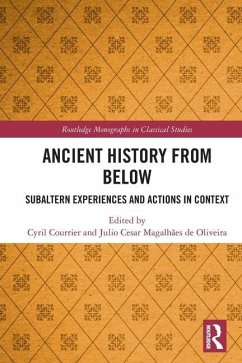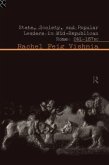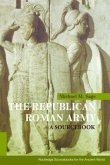If ancient history is particularly susceptible to a top-down approach, due to the nature of our evidence and its traditional exploitation by modern scholars, another ancient history-'from below'-is actually possible. This volume examines the possibilities and challenges involved in writing it.
Despite undeniable advances in recent decades, 'our slowness to reconstruct plausible visions of almost any aspect of society beyond the top-most strata of wealth, power or status' (as Nicholas Purcell has put it) remains a persistent feature of the field. Therefore, this book concerns a historical field and social groups that are still today neglected by modern scholarship. However, writing ancient history 'from below' means much more than taking into account the anonymous masses, the subaltern classes and the non-elites. Our task is also, in the felicitous expression coined by Walter Benjamin, 'to brush history against the grain,' to rescue the viewpoint of the subordinated, the traditions of the oppressed. In other words, we should understand the bulk of ancient populations in light of their own experience and their own reactions to that experience. But, how do we do such a history? What sources can we use? What methods and approaches can we employ? What concepts are required to this endeavour? The contributions mainly engage with questions of theory and methodology, but they also constitute inspiring case studies in their own right, ranging from classical Greece to the late antique world.
This book is aimed not only at readers working on classical Greece, republican and imperial Rome and late antiquity but at anyone interested in 'bottom-up' history and social and population history in general. Although the book is primarily intended for scholars, it will also appeal to graduate and undergraduate students of history, archaeology and classical studies.
Despite undeniable advances in recent decades, 'our slowness to reconstruct plausible visions of almost any aspect of society beyond the top-most strata of wealth, power or status' (as Nicholas Purcell has put it) remains a persistent feature of the field. Therefore, this book concerns a historical field and social groups that are still today neglected by modern scholarship. However, writing ancient history 'from below' means much more than taking into account the anonymous masses, the subaltern classes and the non-elites. Our task is also, in the felicitous expression coined by Walter Benjamin, 'to brush history against the grain,' to rescue the viewpoint of the subordinated, the traditions of the oppressed. In other words, we should understand the bulk of ancient populations in light of their own experience and their own reactions to that experience. But, how do we do such a history? What sources can we use? What methods and approaches can we employ? What concepts are required to this endeavour? The contributions mainly engage with questions of theory and methodology, but they also constitute inspiring case studies in their own right, ranging from classical Greece to the late antique world.
This book is aimed not only at readers working on classical Greece, republican and imperial Rome and late antiquity but at anyone interested in 'bottom-up' history and social and population history in general. Although the book is primarily intended for scholars, it will also appeal to graduate and undergraduate students of history, archaeology and classical studies.
"This trail-blazing volume...offers an innovative bottom-up perspective on the Ancient World. ...This book aims to rewrite not only the past from an innovative perspective, but also the future of the discipline on the key value of intersectionality, reminding the entire scientific community that a writing history is a political act: it has always been an act of power, but it could also become an act of social justice." - New England Classical Journal
"[This book] contributes to advancing the movement to re-evaluate ancient popular cultures that has been underway for two decades, following what has been taking place for longer in other periods in line with the work of Howard Zinn among others. Their study is also a manifesto for a "bottom-up" approach to ancient history, whereas the nature of our sources, the context of writing and the social identity of historians have long favored a top-down approach. Brent D. Shaw offers in his preface a historiographical panorama shedding light on the difficulties of such a history but also its perspectives and its challenges." - Clément Bur, Anabases
"...the volume is a bracing challenge to anyone working on the ancient Mediterranean world. Most of the contributions ask big questions and propose answers through the analysis of specific and detailed data. As a whole it represents a sophisticated international collaboration that rewards careful consideration." - Gnomon
"[This book] contributes to advancing the movement to re-evaluate ancient popular cultures that has been underway for two decades, following what has been taking place for longer in other periods in line with the work of Howard Zinn among others. Their study is also a manifesto for a "bottom-up" approach to ancient history, whereas the nature of our sources, the context of writing and the social identity of historians have long favored a top-down approach. Brent D. Shaw offers in his preface a historiographical panorama shedding light on the difficulties of such a history but also its perspectives and its challenges." - Clément Bur, Anabases
"...the volume is a bracing challenge to anyone working on the ancient Mediterranean world. Most of the contributions ask big questions and propose answers through the analysis of specific and detailed data. As a whole it represents a sophisticated international collaboration that rewards careful consideration." - Gnomon









